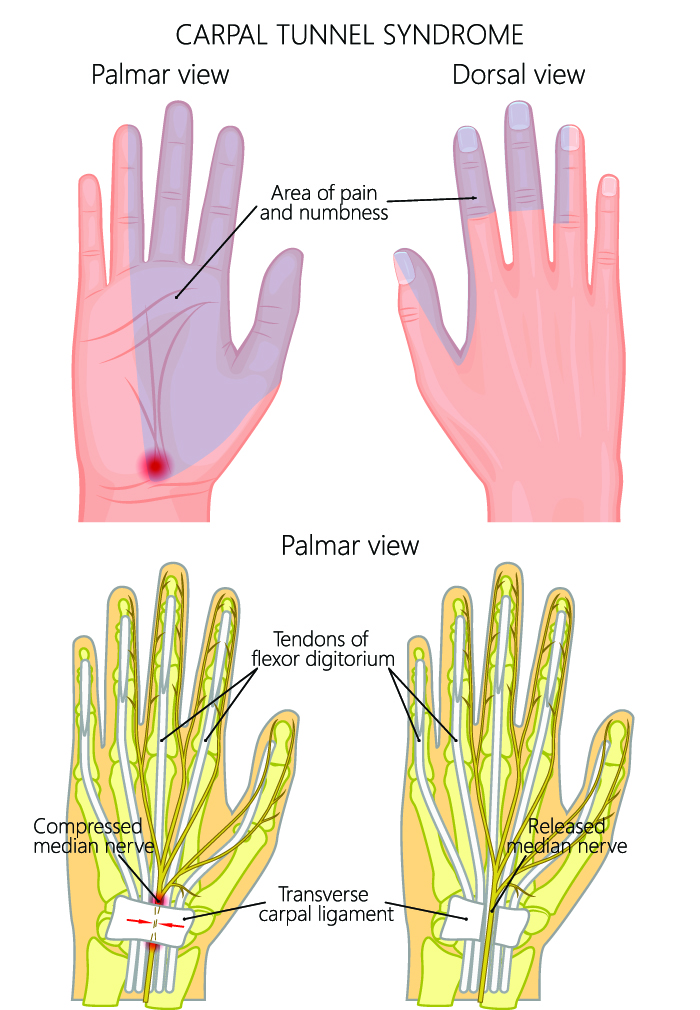Carpal Tunnel Syndrome Surgery in C-scheme, Jaipur
Carpal tunnel syndrome, also known as median nerve compression, is a condition in which your hand feels numb, tingly, or weak. It occurs as a result of pressure on your median nerve, which travels the length of your arm, passes through the carpal tunnel in your wrist, and terminates in your hand. The median nerve regulates the movement and sensation of your thumb, as well as all of your fingers, save the pinky.

Causes of Carpal Tunnel Syndrome?
Many folks have no idea what caused their carpal tunnel syndrome. It can be due to:
- Repetitive actions, such as typing, or other wrist movements that you repeat repeatedly. This is especially true when your hands are closer to your wrists than your wrists are.
- Hypothyroidism, obesity, rheumatoid arthritis, and diabetes are among conditions
- Pregnancy
What Are the Symptoms of Carpal Tunnel Syndrome?
- Numbness in your palm and thumb, or your index and middle fingers, that is burning, tingling, or itching
- Hand tremors and difficulty gripping objects
- A tingling sensation that travels up your arm
- Feelings of shock that travel into your fingertips
- At first, you may notice that your fingers "sleep" and go numb at night. It generally occurs as a result of the way you hold your hand when sleeping.
You could wake up in the morning with numbness and tingling in your hands that extend all the way to your shoulder. Your sensations may worsen during the day if you're holding something with your wrist bent, such as driving or reading a book.
When to See a Doctor at Apollo Spectra, Jaipur?
If you have any of the following symptoms, you should visit a doctor. Any symptoms of carpal tunnel syndrome that interfere with your ability to work. The thumb, fingers, or hand are weak. The index finger and thumb are unable to come together.
How Is Carpal Tunnel Syndrome Diagnosed?
Your doctor may do a Tinel sign test on the palm side of your wrist or completely flex your wrist with your arms extended. They may also conduct tests such as:
- Imaging tests are performed. Your doctor can examine your bones and tissues using X-rays, ultrasounds, or MRI scans.
- Electromyogram. A tiny electrode is inserted into a muscle by your doctor to monitor its electrical activity.
- Nerve conduction studies are a type of research that looks at how the nerves transmit Electrodes are taped to your skin to measure the impulses in your hand and arm's nerves.
How Can We Treat Carpal Tunnel Syndrome?
Your therapy will be determined by your symptoms and the stage of your illness. You might require:
- Changes in your way of life.If your symptoms are caused by repeated motion, take more pauses or perform less of the activity that is giving you pain.
- Exercises. You might feel better by stretching or strengthening your muscles. Nerve gliding activities can help your carpal tunnel nerve glide more freely.
- Immobilization. Wearing a splint to protect your wrist from moving and relieve pressure on your nerves may be recommended by your doctor. Wear one at night to help relieve the numbness or tingling sensation. This can help you sleep better while also allowing your median nerve to relax.
- Medication. To reduce swelling, your doctor may prescribe anti-inflammatory medications or steroid injections.
- Surgery. If none of these therapies works, you may need a procedure called carpal tunnel release, which enlarges the tunnel and relieves pressure on the nerve.
Conclusion
Early treatment of carpal tunnel syndrome with physical therapy and a change in lifestyle can result in considerable long-term improvement and the elimination of symptoms. Carpal tunnel syndrome, if left untreated, can result in irreversible nerve damage, disability, and loss of hand function.
Request an appointment at Apollo Spectra Hospitals, Jaipur
Call 1860 500 2244 to book an appointment.
True. The aetiology of carpal tunnel syndrome is unclear in the majority of individuals. Carpal tunnel syndrome can be caused by any ailment that puts strain on the median nerve at the wrist. Obesity, pregnancy, hypothyroidism, arthritis, diabetes, trauma, and tendon inflammation are all common causes of carpal tunnel syndrome.
Weakened grip and hand strength, burning, cramping, weakness, and wasting of the hand, as well as forearm shooting sensations. Carpal tunnel syndrome may be a transient disease that goes away on its own.
Symptoms
Treatments
Our Top Specialities
NOTICE BOARD
CONTACT US
CONTACT US
 Book Appointment
Book Appointment


.svg)
.svg)
.svg)
.svg)








